 Petzlover
Petzlover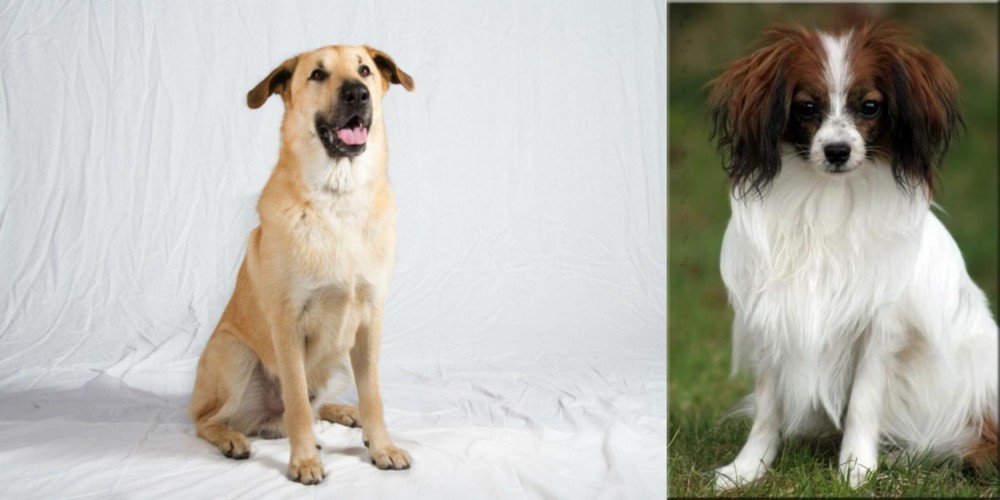 Chinook is originated from United States but Phalene is originated from France. Chinook may grow 41 cm / 17 inches higher than Phalene. Chinook may weigh 36 kg / 80 pounds more than Phalene. Both Chinook and Phalene has same life span. Chinook may have more litter size than Phalene. Chinook requires High Maintenance. But Phalene requires Moderate Maintenance
Chinook is originated from United States but Phalene is originated from France. Chinook may grow 41 cm / 17 inches higher than Phalene. Chinook may weigh 36 kg / 80 pounds more than Phalene. Both Chinook and Phalene has same life span. Chinook may have more litter size than Phalene. Chinook requires High Maintenance. But Phalene requires Moderate Maintenance
 In the early 20th century, in the small town of Wonalancet, New Hampshire a new breed of dog called the Chinook was born. Developed by Arthur Treadwell Walden, the breed is named after the first male ancestor who was named Chinook. The breed is a rare sled dog and the official dog of the state of New Hampshire. The Chinook was born of a cross between a large Mastiff-like street dog and huskies that were part of the Peary North Pole expedition.
In the early 20th century, in the small town of Wonalancet, New Hampshire a new breed of dog called the Chinook was born. Developed by Arthur Treadwell Walden, the breed is named after the first male ancestor who was named Chinook. The breed is a rare sled dog and the official dog of the state of New Hampshire. The Chinook was born of a cross between a large Mastiff-like street dog and huskies that were part of the Peary North Pole expedition.
Walden was an experienced slender and looking for a dog that was stronger, faster and had more stamina than his current sled dogs. Walden had years of experience including being the trainer and lead on Byrd’s 1929 Antarctic expedition and plenty of Yukon experience. Once he had the male Chinook he bred him with German Shepherds, Belgian Sheepdogs and Canadian Eskimo Dogs at the very least. He then bred those puppies back to Chinook until he had the type and traits he wanted. Following Walden, Julia Lombard and then Perry Greene took over mastery of the breed. From the 1940’s until he died in 1963, Greene was the only person who was breeding Chinooks. So, there were few left after his death. The breed neared extinction by 1981 with only 11 Chinooks available to breed. These dogs were divided between three breeders who saved the breed from becoming extinct.
In 1991, the United Kingdom recognized the Chinook and they were also registered with the UKC. At that time there were about 800 dogs in the breed. To increase the breed, there was a cross-breeding program that took Chinooks and bred them back to the breeds they considered to be apart of the original Chinook lineage. These 4th generation dogs might meet the standards of the Chinook Owners Associations Cross Breeding Program and be accepted as purebred.
In 2001 the Chinook was entered into the AKC Foundation Stock Service and added to the Miscellaneous class of the AKC in 2010. In January of 20113, the Chinook was finally granted full recognition and breed status within the AKC in the working group. He is a large working dog, rugged, patience, loyal and intelligent. He is one of the rarest breeds in the AKC.
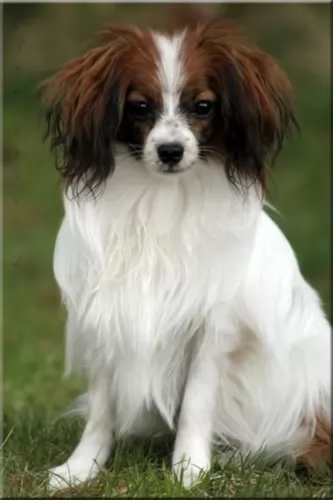 The Phalène is a toy breed, and in fact the Papillon and Phalène differ only by their ears, but are exactly the same in all other ways.
The Phalène is a toy breed, and in fact the Papillon and Phalène differ only by their ears, but are exactly the same in all other ways.
Thought to have developed in Western Europe, its exact origin isn’t clear but it is an ancient breed, as paintings seem to indicate that it has been around since the 16th century.
It is essentially a companion dog today. The dog is classified as a variety of the Papillon by the AKC, with the FCI classifying it as a separate breed.
 The Chinook is a muscular dog, making him a perfect fit to be a sled dog or a hauler of any type. He has a deep chest and powerful muzzle with enduring teeth. The ears can be pricked up or bent and wind-blown. The nostrils of the Chinook are solid black and wide, while the lips are black, the eyes look like almonds and are dark with intelligence in their glance. The feet are firm and oval, the pads cushioned and with dark pigmentation. The tail should not be docked.
The Chinook is a muscular dog, making him a perfect fit to be a sled dog or a hauler of any type. He has a deep chest and powerful muzzle with enduring teeth. The ears can be pricked up or bent and wind-blown. The nostrils of the Chinook are solid black and wide, while the lips are black, the eyes look like almonds and are dark with intelligence in their glance. The feet are firm and oval, the pads cushioned and with dark pigmentation. The tail should not be docked.
The breed has a double coat and hair of medium length The undercoat is soft and thick while the outercoat is close to the body and coarse. The Chinook is usually a tawny, reddish color.
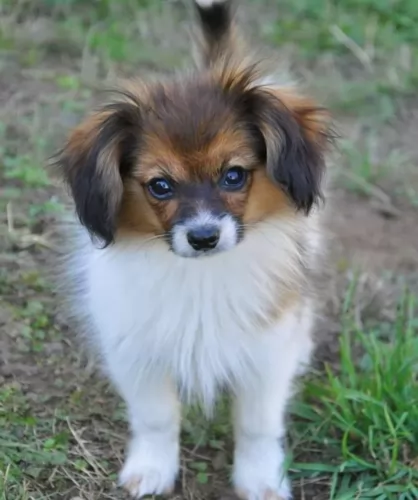 This toy breed stands at between 20 – 28cm in height and weighs around 4 – 5kg. He has floppy, silky ears and is a Papillon dog, and a Papillon with dropped ears is known as a Phalène.
This toy breed stands at between 20 – 28cm in height and weighs around 4 – 5kg. He has floppy, silky ears and is a Papillon dog, and a Papillon with dropped ears is known as a Phalène.
The dome of the head is rounded and the Phalene has a slim muzzle with bright, alert brown eyes and a black nose. The tail is well plumed and is carried over the back. The coat isn’t a double coat like many other dogs, but it is lustrous, being straight, long and smooth. The coat is available in a number of coat colors, essentially being a blend of white, tan, black and orange or fawn.
The Phalène is an intelligent dog, and they will be able to learn quickly and easily when you teach them how to sit, lie down or stay. Training and socialization is always excellent for dogs, even small ones like this as it teaches them to be obedient and well mannered.
The Phalene is a sociable, friendly dog but is inclined to be reserved around strangers. Phalènes are essentially lap dogs and they make great companions for all kinds of people as well as being great playmates for disciplined, kind children. Because he is small and calm, he makes a great pet for country- or city dwellers.
 This is a playful, affectionate and loyal breed. They have a special love for kids and always want to learn and please you. They are intelligent and very trainable. The Chinook is good with other dogs and as a sled dog they love to work in packs. They can be reserved but they are never aggressive or shy.
This is a playful, affectionate and loyal breed. They have a special love for kids and always want to learn and please you. They are intelligent and very trainable. The Chinook is good with other dogs and as a sled dog they love to work in packs. They can be reserved but they are never aggressive or shy.
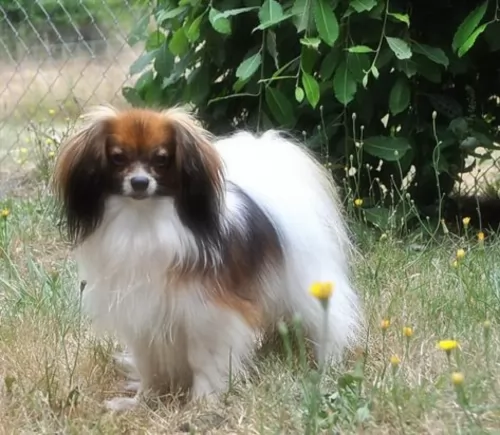 The Phalene is such a sweet little dog, and you can definitely count him as as ‘man’s best friend’. He just loves to be wherever his human family is, lapping up their attention indoors but also loving being with them outdoors. When well trained and socialized, these dogs make splendid playmates for children too.
The Phalene is such a sweet little dog, and you can definitely count him as as ‘man’s best friend’. He just loves to be wherever his human family is, lapping up their attention indoors but also loving being with them outdoors. When well trained and socialized, these dogs make splendid playmates for children too.
Small though he is, he makes a good watch dog too and he will bark to warn his human family of danger. Give him the love and care he so rightly deserves, and he promises to make you a splendid pet and companion.
 For the most part, the Chinook is a healthy dog. There are however some issues they do have to contend with including:
For the most part, the Chinook is a healthy dog. There are however some issues they do have to contend with including:
Sometimes know as Chinook seizures this is really a movement disorder and perhaps not a true epilepsy.
This dermatitis may be hereditary. It causes itchy skin and is actual an immune system issue.
Chinook are known for a variety of gastrointestinal disorders manifested by diarrhea and vomiting.
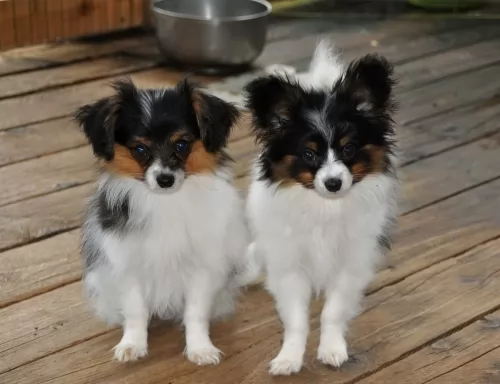 Your jaunty little Phalene can live to be up to 12 or 15 years of age if well cared for. Even so, there are always some of the more common dog illnesses worth knowing about, and we look at a few -
Your jaunty little Phalene can live to be up to 12 or 15 years of age if well cared for. Even so, there are always some of the more common dog illnesses worth knowing about, and we look at a few -
Any dog can get epilepsy – when your pet suddenly has a seizure or fit for no apparent reason. It can be disturbing to see, but with medication your pet can live a normal life.
Always keep a check on your pet’s eyes because there are a few eye diseases that can affect your pet and these are cataracts, progressive retina atrophy and entropion. Thankfully a veterinary ophthalmologist can help with the best treatment.
 Don’t overfeed your dog. Based on how hard he is working for you feed twice a day. Dividing 3 to 5 cups into two meals.
Don’t overfeed your dog. Based on how hard he is working for you feed twice a day. Dividing 3 to 5 cups into two meals.
Although the Chinook is still active in recreational sledding, he is mostly a family pet these days. Given this the Chinook need a good deal of exercise and competition. They are great at search and rescue, dog packing, agility, obedience, herding, carting and skijoring. They need some form of solid exercise for 30 to 60 minutes every day.
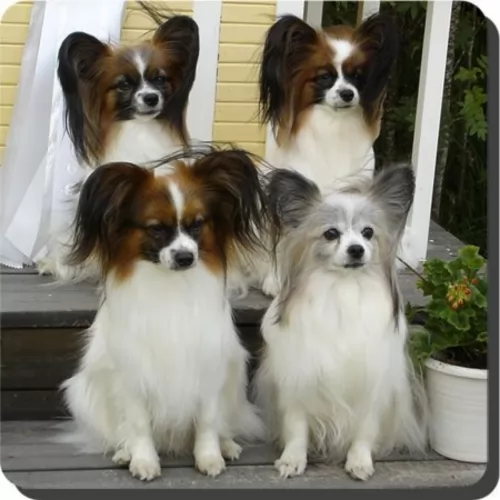 These are energetic little dogs and will require getting a regular dose of exercise. He loves a walk and being allowed off his leash for a good run. He also loves ball games. Exercise is important for small dogs like this to ward off obesity.
These are energetic little dogs and will require getting a regular dose of exercise. He loves a walk and being allowed off his leash for a good run. He also loves ball games. Exercise is important for small dogs like this to ward off obesity.
These little dogs will need to have their ears checked and cleaned if you want to avoid ear infections. If you’re not sure how to clean the inside of the ears, rather leave it to an expert who can show you how its done. Small dogs always need to have their teeth checked regularly. He will also need to have his nails trimmed.
To maintain the long, silky coat, brush your dog at least twice a week. Some Phalene dog owners take their pet to the vet to have the coat professionally groomed and trimmed.